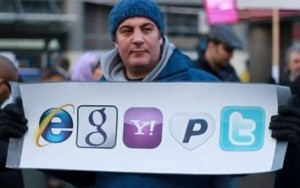In these early days of 2011, contrary to the opinions of some, social networking has passed the tipping point. An interesting assertion but how do we know this?
All we can do is look at the evidence of these changes and it is mounting. We review the numerous attempts to impair internet communications and access to social media and start by sharing this quote during the crisis in Egypt.
“Clearly, what’s rattled the government is the major role that social media has played in the protests rocking the country’s cities, including Cairo.
“Facebook, Twitter, YouTube, and even Google Docs have been used in unprecedented ways this time around — both for coordination, and for disseminating news,” Jillian York, Harvard University, Berkman Center for Internet & Society
 Our small, medium and large screens are filled with images from around the world starting from the ongoing revolutions in the Middle East and North Africa, first the fall of #Tunisia, then #Egypt and now #Libya where it seems to only be a matter of time.
Our small, medium and large screens are filled with images from around the world starting from the ongoing revolutions in the Middle East and North Africa, first the fall of #Tunisia, then #Egypt and now #Libya where it seems to only be a matter of time.
And not surprisingly, at this time even the protests in Iran and China are starting to heat up again and the governments there are clamping down quickly each time before the protest momentum can build to any significant level.
But interestingly there are also emerging examples here in North America surrounding both labor #wiunions and entertainment #oscars that are also demonstrative of the accelerating impact of social.
Read more
 In the traditional model, you can only play one program at a time. One radio show or one movie or one show…
In the traditional model, you can only play one program at a time. One radio show or one movie or one show… This is the first part in a short series to introduce
This is the first part in a short series to introduce 

 We’re hearing more and more about “Relationship Commerce” these days – but how many of us actually understand its implications? I’ve spent years in the midst of the evolution of commerce: As traditional commerce shifted into a digital world, through it’s evolution into Social Commerce, and now as we come upon the brass ring – Relationship Commerce.
We’re hearing more and more about “Relationship Commerce” these days – but how many of us actually understand its implications? I’ve spent years in the midst of the evolution of commerce: As traditional commerce shifted into a digital world, through it’s evolution into Social Commerce, and now as we come upon the brass ring – Relationship Commerce.